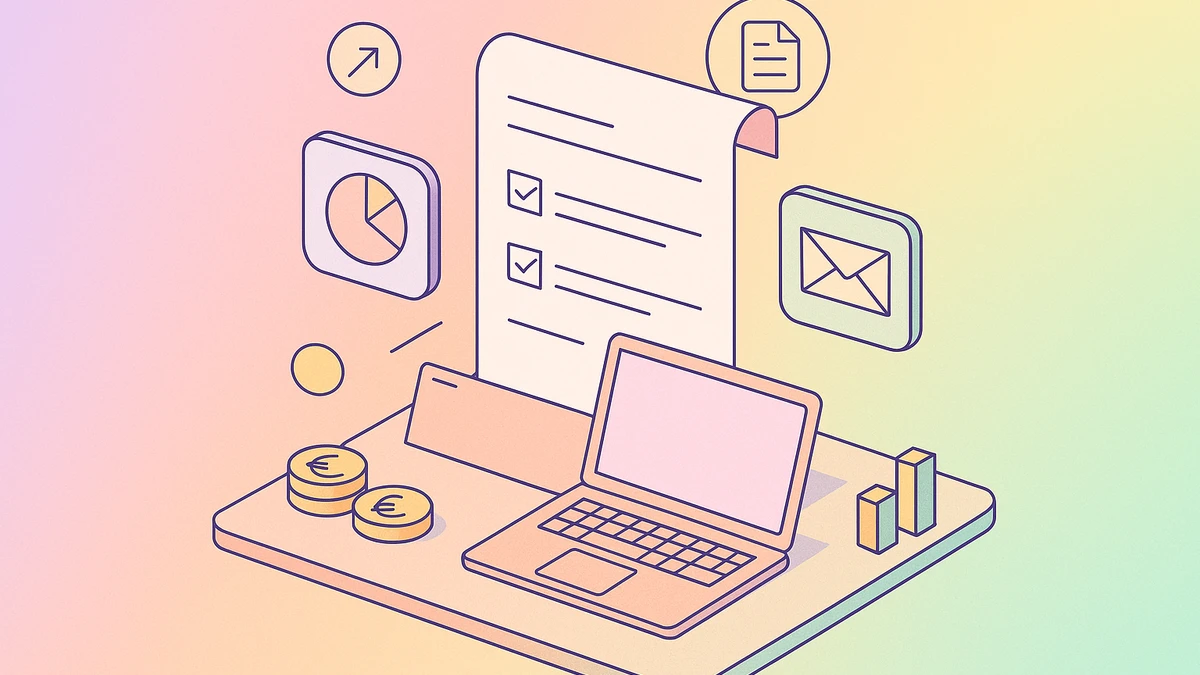All you need to know about electronic invoicing reform
Summarize this article with AI
Open the article in your preferred AI to summarize, explore and save it for later.

The reform of electronic invoicing will transform the way French companies manage their transactions. From 2026, all companies subject to VAT will have to issue and receive invoices in electronic format via approved platforms. What are the objectives of this reform? Who is affected? How do you prepare for it? We explain everything in this article.
Why is the e-invoicing reform being implemented?
The move to electronic invoicing is designed to modernize commercial exchanges while strengthening tax control.
Objectives and challenges
The reform has several strategic objectives:
Combating VAT fraud In France, VAT fraud is estimated at more than 20 billion euros a year according to Court of Auditors Digitization will enable real-time control of transactions and reduce fraud and reporting errors.
Aligning with European directives The European Union is encouraging the dematerialization of transactions to harmonize tax practices and combat tax evasion.
Automate and simplify exchanges Electronic invoicing reduces administrative tasks, cuts processing times and improves the traceability of financial flows.
Who is affected by this reform?
All companies subject to VAT in France will have to adopt electronic invoicing, whatever their size.
Impacted companies : large companies, ETIs, SMEs, VSEs, micro-businesses.
Transactions concerned all operations B2B domestic (invoices issued between French companies subject to VAT).
Excluded transactions sales to private individuals ( B2C ) and transactions with foreign companies remain subject to reporting obligations, but not to mandatory electronic invoicing.
Key reform dates and implementation schedule
The reform will be rolled out gradually between 2026 and 2028.
Three-phase deployment
| Effective date | Companies concerned |
|---|---|
September 1, 2026 | Large companies |
September 1, 2027 | Mid-sized companies (ETI) |
September 1, 2028 | SMEs, VSEs and micro-businesses |
What are the obligations at each stage?
Every company will have to gradually adopt the new invoicing standards.
Issuing and receiving electronic invoices via the PPF (Portail Public de Facturation) or a PDP (Plateforme de Dématérialisation Partenaire).
Transaction reporting to the tax authorities via the e-reporting to improve transparency and VAT collection.
Updating accounting tools to guarantee invoice compliance with regulatory formats (Factur-X, UBL, CII).
Electronic invoicing and e-reporting: what are the precise obligations?
This reform adds a number of additional obligations for companies.
Mandatory electronic invoicing: how does it work?
As soon as the reform comes into force, all invoices will have to be :
Created and sent in structured electronic format (Factur-X, UBL or CII).
Transmitted via an approved platform PPF (state-run) or a registered private PDP.
Electronically archived for at least six years in accordance with tax requirements.
E-reporting: an additional obligation
For transactions not covered by electronic invoicing (B2C and international exchanges), companies will have to transmit certain information to the tax authorities via e-reporting .
Data concerned transaction amounts, output VAT, customer number.
Frequency Periodic data transmission (monthly or quarterly).
Objective The aim is to enable VAT returns to be pre-filled, and to strengthen controls.
What are the penalties for non-compliance?
Failure to comply with the new rules will result in financial penalties and stricter controls:
15 fine per non-compliant invoice with a ceiling of 15,000 for an amount of .
Penalties for non-declaration e-reporting transactions.
Risk of tax reassessment in the event of repeated omissions or irregularities.
How can you prepare your company for the reform of electronic invoicing?
As you can see, this reform requires serious preparation.
Check the compliance of your billing software
To avoid any interruption in invoice processing, it's essential to ensure that your software complies with the new requirements.
Select a Partner Dematerialization Platform (PDP)
Companies can choose between Public Billing Portal (PPF) or a Private PDP . Here's how to choose the right platform :
Train your teams and adapt your processes
The transition to electronic invoicing is more than just a change of tool. It involves internal reorganization:
Training accounting teams electronic invoice management and e-reporting.
Implement new internal processes for validating and archiving invoices.
Anticipating technical changes testing invoicing solutions before the obligation deadline.
What are the concrete benefits of this reform for companies?
The reform brings benefits not only for tax inspectors, but also for businesses.
Fewer errors and simpler tax audits
Electronic invoicing reduces data entry errors and guarantees complete traceability of exchanges. Companies gain peace of mind during tax audits.
Optimize cash management
Invoice automation speeds up payments and improves monitoring of cash receipts and disbursements. Thanks to e-invoicing, payment delays should be reduced, improving companies' cash flow.
Why choose Hero for reform compliance?
The reform of electronic invoicing is fast approaching. Hero offers you a progressive solution, designed to accompany each stage of your compliance process, while simplifying your day-to-day management.
From summer 2025 you can send your electronic invoices in legal format directly from your Hero space.
Then you can receive and payer your electronic invoices centrally, for simpler, faster processing.
And that's not all: from september 2025 Hero will feature a electronic invoice financing solution to improve your cash flow and speed up payment of your customer invoices.
We will also connect to a PDP partner by the end of 2025, to guarantee access to the official government directory. Our goal: to become ourselves as a Partner Dematerialization Platform (PDP) in 2026 to offer you an all-in-one, 100%-compliant, high-performance solution.
With Hero, you're ready to face new regulatory requirements with ease.